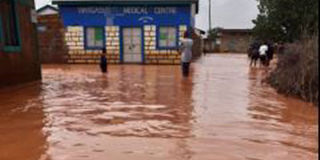Let us put a stop to devastating flood cycles and avoid disasters

A flooded section of Wargadud Town in Mandera South. PHOTO | MANASE OTSIALO | NATION MEDIA GROUP
What you need to know:
- Floods have both natural and man-made roots.
- Of all the floods in Kenya, rain-begotten floods are the most prevalent.
Floods are a trepidation to anyone living in a lowland. This terror should be an existential concern for anyone to whom the lower end of a reservoir or in the expansive lowlands of the Rift Valley, Nyanza, western and central Kenya and the coastal region as well as the drainage basins and dells of large rivers are home.
Floods have both natural and man-made roots. However, the natural fountainheads may have a human linkage. No disaster can occur naturally without some human sway. This encompasses space disasters. A meteorite impacting the earth’s surface, for instance, may be attributed to disturbance of Space by man — through his valiant space exploits.
FLOODS
Of all the floods in Kenya, rain-begotten floods are the most prevalent. Their genesis is simple: All that is needed is bare land, without trees or grass, and abundance of rain. This is a recipe for immoderate overland flow/surface runoff and murderous floods.
The more intensive the rain falling on a barren or semi-barren land is, the more likely a flood will occur, accompanied by other environmental hazards and disasters such as rockfalls, landslides and disease outbreak.
In the towns and cities, a myriad factors are to blame for the frequent urban floods.
First, there are the hundreds of hectares under concrete that can easily assume the role of bare land in deluge dynamics. These may be quotidian pavements, tarmac roads, rooftops, parking lots and other surfaces that cannot allow rainwater to infiltrate the earth.
Second are clogged drainage channels and construction of buildings on natural waterways, without considering clearance for running water.
CHOKE DRAINAGE
The flood scenario in many towns is orchestrated by unethical sane individuals who act independently but collectively choke drainage systems through careless disposal of waste. It’s like one plugging up their toilet system and when the grime begins to stink cry ‘serikali saidia!’
Except for emergency floods such as those fomented by broken reservoir walls, tsunamis and flash floods, floods are usually expected, every rainy season, in the flood-prone rural areas and towns with poor wastewater drainage systems.
Unfortunately, we choose to be laggards in taking precautionary action. It is unimaginable watching and reading about people in river valleys who wait in their flood-marooned homes till water covers their shin bones before fleeing for dear life! Floods are not a game of cards; they cause death, destruction and mayhem.
Fighting floods and other environmental hazards and disasters calls for integrated efforts of all concerned. Action must be undertaken this rainy season to break flood cycles.
WATER RESERVOIRS
First, existing and future water reservoirs should be audited annually to ascertain their credibility. This has begun and big-up to the government. Secondly, weather information should be disseminated broadly, especially early flood warning.
This will promote predictive flood mitigation and enable people to vacate flood paths.
The gallant forest protection measures in the country should continue and weirs, millponds, levees, dams, dykes and embankments/bunds constructed on the rivers that commonly surrogate floods.
The local administration should discourage construction of settlements on dry waterways as water never forgets its pathway.
Terracing of steep lands is advisable to break overland flow and percolate most of its water. Soil retention systems can be used variably to effect this.
DETRIMENTAL EFFECTS
For the urban areas, all wastewater drainage channels must be cleaned and fresh ones constructed.
Information and responsibility are key to combating floods and their detrimental effects. Understanding that one’s safety is one’s first responsibility is top on the list, followed by all strides that go towards ending flood troubles in the country.
Finally, those who refuse to move out of flood ways should also be forcibly evacuated for their own sake.
Dr Kipkiror, an environmental expert, teaches at the University of Kabianga. [email protected]





